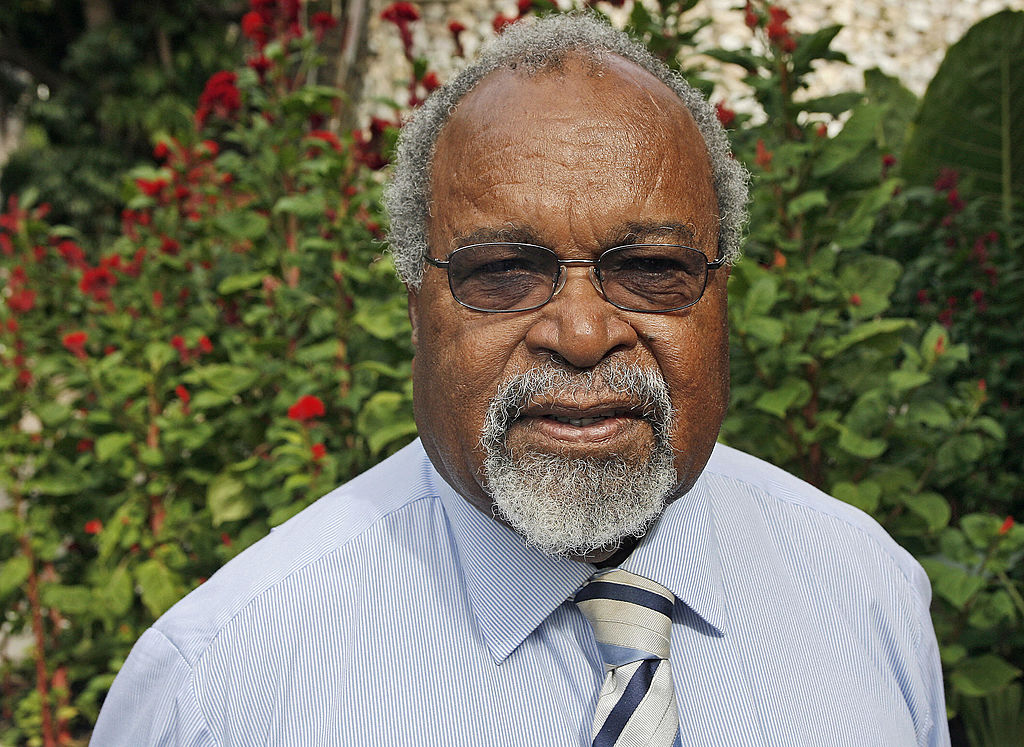Sir Michael Somare’s passing marks the end of an era for Papua New Guinea
Posted By Jeffrey Wall on March 1, 2021 @ 11:05

The passing of Sir Michael Somare, the first chief minister and the founding prime minister of Papua New Guinea, ends a remarkable political life that began when he was elected to the pre-independence House of Assembly in 1968 and saw him serve four terms as prime minister.
No PNG prime minister worked with more Australian prime ministers and their governments. As chief minister from 1973 he worked with the Whitlam government on the transition from self-government to independence in 1975. He subsequently worked with the Fraser, Hawke, Howard, Rudd and Gillard governments during his four terms as his nation’s head.
Prior to self-government he had gained the confidence of territories minister, Andrew Peacock, an association that helped secure bipartisan support for self-government.
Before independence could be achieved, Somare had to secure support for it in the House of Assembly after he was elected chief minister in 1973.
History records that while there was bipartisan backing in Australia for the broad independence timetable, there was far from unanimous support in the PNG House of Assembly, or in the wider community.
Somare used his negotiating skills not just to map out with Australia a pathway to independence, but also to form an effective and representative government coalition that supported the independence timetable and would deliver the national constitution necessary to secure stability and, above all, unity.
For his first administration as chief minister he chose wise, respected men as key ministers, such as Sir John Guise as deputy chief minister, Sir Julius Chan as finance minister as well as Sir Albert Maori Kiki, Donatus Mola and Thomas Kavali. My first employer in PNG politics, Sir Iambakey Okuk, also joined the ministry.
The new administration negotiated with Australia the transition timetable and budgetary and other ongoing support enabling independence to be achieved in 1975, barely three years after self-government.
The personal relationships Somare developed with both the Whitlam government and the Coalition opposition were critical, along with evidence of parliamentary and community support within PNG as a whole, to secure independence harmoniously.
His administration undertook a comprehensive and genuine consultation process that led to the approval of the constitution, a document that has essentially served PNG well since independence.
The constitution included the appointment of Queen Elizabeth II as head of state, a representative national parliament and, importantly, an independent judiciary that would ensure the constitution was upheld by both government and parliament.
The peaceful transition to independence was unquestionably Somare’s greatest achievement.
To that needs to be added the national unity that has largely been maintained since. Holding the young nation together was not easy. It required compromises that may not have served PNG well, but which maintained national unity. With the overwhelming pro-independence vote on Bougainville in 2019, that unity is being tested and will be a significant challenge for the current and future national governments.
Somare had a remarkable capacity for forgiveness, as the make-up of his administrations in 1975–1980, 1982–1985, 2002–2010 and 2010–2011 demonstrates. Onetime opponents became political partners. He was a master at forming governments by drawing on different parties and groups to secure a parliamentary majority.
Overall, his relations with Australia were harmonious and mutually beneficial. For much of Somare’s time in office his foreign minister was Sir Rabbie Namaliu who remains widely respected in Canberra.
There were occasional differences, but they did not unduly undermine good relations.
Somare established diplomatic ties with China at independence in 1975 and pursued a ‘one China’ policy. He also maintained close relations with regional neighbours, notably Indonesia, Singapore, Malaysia, Japan and the Philippines. PNG played a positive role in the Commonwealth, the United Nations and the Pacific Islands Forum.
In all my engagements with Sir Michael I found he held Australia, and Australians, in high regard. That was especially demonstrated when he made an historic address to the Cairns session of the Queensland Parliament in 2008.
He followed Australian horse racing, and between his terms as prime minister I had the privilege of taking him to the races in Brisbane where he was absolutely in his element. He used to say to me ‘Jeffrey, please don’t get me invited to the official lunch—it interferes with my enjoyment of the races!’
Apart from his key role in achieving independence, the standout feature of his career was its longevity, from its beginning in 1968 until his retirement in 2017.
PNG has a robust and at times tumultuous parliamentary democracy. That he survived in it is a tribute to his popularity and his political skills.
Somare’s passing marks the end of an era and a unique life that will not be equalled or surpassed in the importance of its contribution to the life of our closest neighbour.
Article printed from The Strategist: https://www.aspistrategist.org.au
URL to article: https://www.aspistrategist.org.au/sir-michael-somares-passing-marks-the-end-of-an-era-for-papua-new-guinea/
Click here to print.